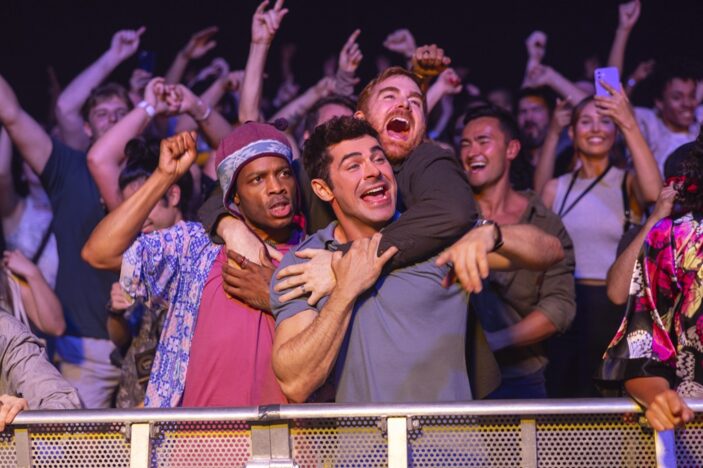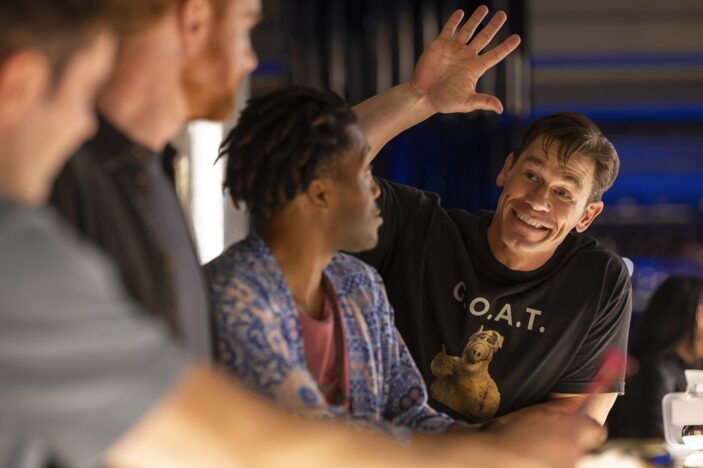
When three childhood best friends pull a prank gone wrong, they invent the imaginary “Ricky Stanicky” to get them out of trouble! Twenty years after creating this ‘friend,’ Dean (Zac Efron), JT (Andrew Santino), and Wes (Jermaine Fowler) still use the non-existent Ricky as a handy alibi for their immature behaviour. When their spouses and partners get suspicious and demand to finally meet the fabled Mr. Stanicky, the guilty trio decide to hire washed-up actor and raunchy celebrity impersonator, “Rock Hard” Rod (John Cena), to bring him to life. But when Rod takes his role of a lifetime too far, they begin to wish they’d never invented Ricky in the first place.
A wild, raunchy comedy from the comedic mind of Peter Farrelly (Green Book, There’s Something About Mary, Dumb and Dumber), Ricky Stanicky is set to take over Prime Video when he’s unleashed on March 7th. To coincide with the film’s anticipated release, Peter Gray was invited to the global press conference to hear director Farrelly, and the principal cast – also including comedian Jeff Ross and William H. Macy – talk about what it was about this script that caught everyone’s attention, if this much collective comedic talent made it difficult to get through scenes on set, and why comedy will always be assisted by a more serious moment.
Peter, let’s start with you. Tell us a little bit about the origins of Ricky Stanicky. I assume, like your last two films, Green Book and The Greatest Beer Run, this is based on a true story?
Peter Farrelly: Yes, it is all true. No. You know, like a lot of my projects, this took forever to get made. Honestly, I think this was floating around for 15 years. But they all were. It’s unbelievable. Dumb and Dumber took, like, five years to get made. (There’s Something About) Mary took 10 years. And so, that’s why you always work on three or four things at the same time, and hopefully, one of them comes through. But this was a long simmering project. Because of that, I look back and I’m grateful because we were able to work on it over the years, and I think it just got better and better and better. And I’m really proud of it. I love what we ended up with. And these guys, I mean, it couldn’t have been a better cast than these guys.
You won an Oscar recently for Green Book. Congratulations, by the way. I think the fans of your comedy maybe might have been a little worried that we lost you to the world of prestige films. Are you back? Are you gonna sort of pivot between both lanes?
Peter Farrelly: You know, I never plan well. I’ll do comedies, then dramas, then this. I just do the thing that they’ll make, and this is the one now (laughs). You know, honestly, I have three or four at a time going and this is the one they greenlit, so I made it. Pretty much.
Zac Efron: Hey, this film is very prestigious. Look at this cast.
Andrew Santino: He’s back doing trash again.
For the cast, you know, we always hear about sort of the tradition that they have on Farrelly movies, and using a lot of the same crew members. Zac, you’ve done a couple in a row now. How was working on a Peter Farrelly film different from any other experience you’re gonna have on set?
Zac Efron: How’s it different? You know, working with Pete’s the best, man. Pete has an incredible sense for tone. Like, he knows what he’s doing. You can trust him with pretty much everything. You know, it’s just really fun to work with him. Like, figuring out plans, ideas, characters, everything is just, it’s a laugh. It’s enjoyable. It’s really constructive. So, I would do just about anything with Pete. It’s super fun, man. Beer Run was a blast. This was even more fun.
Jermaine Fowler: He’s a fucking liar. He’s a terrible, terrible person.
How was your experience?
Andrew Santino: I didn’t enjoy working with Pete.
Jermaine Fowler: No. We signed an NDA (laughs).
Andrew Santino: Yeah. No, it was incredible. Pete likes to use people from his life, and almost every movie he’s done involves people from his life, which I think is incredible. And he just knows how to really stay on task, which is tough to do with comedy. I think of all the comedies I’ve ever been involved, like TV stuff, people go off and you start to get in these weird diatribes and you lose sense.
Jermaine Fowler: Especially with comics. We always wanna one-up each other. Yeah.
Andrew Santino: Yeah. He’s so good at being like, “Get here again.” And then you can kind of play and go back. And he’s probably the best I’ve ever worked with at reining comedy in. It’s so hard to do…
Peter Farrelly: Staying on the path.
Andrew Santino: Yeah. It’s really tough. I mean, that’s such a minutia thing, but it’s really true. It’s so hard. People don’t really know how hard that is when you have four people improvising. It’s tough to, like, stay in the thing. But Pete would go, “Well, no. No. No.”
Jermaine Fowler: He’ll tell it to you straight up. He’ll be like, “No.”
Andrew Santino: “No.” Yeah. “No, that’s not funny.”
Zac Efron: Which is great, ’cause that’s what you want. Like, you don’t need it sugarcoated. You want to be good.
Peter Farrelly: Get us done early.

What part of the script caught your attention the most? Aside from the “air dicking”?
William H. Macy: Air dicking! Oh, damnit.
John Cena: For me, it was the concept of the whole thing. How do you make an imaginary friend real? And then you read it again and again. And man, I never wanna tell the audience what to take away from the movie, but there’s so much there that you can take away from the script and just the journey of everybody. I think you discover something new every time. Originally, I just wanted to know how they’d pull it off. And man, it’s so beautifully written and then as you see it develop, even every time I see it, I still take more stuff away. But that was the original thing that caught my eye.
What was it about John that made you want to cast him, Peter?
Peter Farrelly: I saw him in Peacemaker.
John Cena: Nothing prestige?
Peter Farrelly: And I was about two minutes into Peacemaker and I said, “That guy.” I could not believe how hilarious he was. I thought the way he committed to that character it was a no-brainer. At that moment, I knew that he had to be him. And if he wanted to do it, it was gonna be him. And we got together and went for it. But, by the way, talking more about the plot, it’s really about, like, what happens when your lie comes alive. You know, people lie all the time, but what happens when that comes to life, those lies? And why do you lie? You know, people lie for a reason. They don’t lie for nothing. This wasn’t just a bunch of, you know, assholes out there lying. You know, there are reasons you lie. And we kind of analyze that, too, which that’s the thing I’m most proud of for the script. There is a reason, you know, that they’re behaving this way.
Zac, you have played so many different roles across so many different genres of film. What do you do to prepare specifically for a comedic role?
Zac Efron: I just honestly listen to Pete, you know? It’s not that much different than doing a drama. It’s all real, you know? So, it’s the same stuff. This is a great crew. I got to sit and listen to really great actors. So, you’re just feeding off the energy of the group, of the tribe. And yeah, that’s kind of the way I go about it.
I mean, speaking of preparation, Ricky is a very intense role preparer. Did that inspire you guys, seeing how just intensely committed to this character John was? Were you like, “Oh, no. This is how we have to approach roles now?”
John Cena: Didn’t inspire me at all (laughs). I learned a lot, what not to do, how not to live. Yeah. Exactly.
Zac Efron: No, your commitment was very inspiring. It was great. It was great.
Were there any scenes that were difficult to get through? Given this cast…
Jermaine Fowler: I think it was the first scene we shot together. John, Zac, and Santino. Like, I think it was a casino scene when John was doing the “shit baby” monologue. Excuse my language.
Zac Efron: That was the first day of filming.
Jermaine Fowler: Yeah.
Zac Efron: Yeah. It was a huge day, a massive day.
Jermaine Fowler: Genuinely laughing. It was wonderful. Also, seeing their reaction made me laugh. That was one of the times I couldn’t really keep it together.
Zac Efron: Keeping it together off camera was impossible when he’s doing his thing.
I bet.
John Cena: And also, good chemistry from the jump. Like, you know, all four of us in a long day of work for the first day all together. And honestly, it just felt like a team from the first frame. So, I think that made it fun especially, too.
Zac Efron: And we were in a casino and they were pumping in the oxygen. Yeah.
Andrew, you have a background in stand-up comedy. Did that help you at all with your character?
Andrew Santino: I think it helped just my acting in general, just being a comic and walking into the world of, you know, Pete. Comedy definitely helps my preparation, you know, for timing and learning of rhythm of stuff like that. I think that definitely, definitely helps. And it makes you listen more. I think that’s the best part of comedy. And if you’re improving or you’re bouncing or whatever, it’s just listening to what these guys are saying and trying to utilize it for whatever else you’re doing. So, I mean, yeah, I think so. I hope so. I mean, stand-up is usually alone.
And similarly for Jeff. I mean, coming from an incredibly successful comedy and stand-up career, was it different to jump into a scripted role such as this one? And did you take any liberties with your role?
Jeff Ross: It’s funny you mention that because the whole cast came to see me perform the night before I started on set. So, I showed up, you know, from a 3am night to a 7am call. And when it’s funny, it’s not hard. It’s only hard to make the adjustment when it’s not funny. But the script, my part, I loved it so much that I grabbed it. And John understands the idea of coming off tour and going right to work as an actor. And he wrote me a nice note at the end of the shoot, at the end of my part, saying “I know how hard it is to drop your stand-up and come in.” And I came in for a week in a middle of the shoot. They were already a team, in sync. And you know, I gelled well with that. I really liked joining the group. It was kind of a fun departure from stand-up. And I’m so psyched for the movie. So, so psyched for it.

For William, your character is quite the standout and has a major impact on the story. How do you balance the seriousness of your boss role with the raunchy verbal and slapstick comedy?
William H. Macy: Well, I subscribe to the notion that it’s not an actor’s job to the funny. It’s the writer’s job to be funny. And I think things come out funnier if the actor is playing the throughline. That’s what makes it funny. But my whole career, I mean, even the serious stuff I’ve done, I always think you need to bring a little levity into it. God help us from these movies that are unrelentingly sad. I think it’s a Mike Nichols rule. If you want people to laugh, come off a serious moment. And if you want people to cry, come off a comedic moment.
Peter Farrelly: I never bought the whole idea that there were comedic actors and serious actors, by the way. From day one on Dumb and Dumber, we had Jim Carrey and we wanted Jeff Daniels. And the studio said, “No, no, no. Bring in a, you know, comedy actor.” I said, “What are you talking about? Jeff Daniels, he can do anything. He’s a great actor.” And that’s you (William), you know? You can do anything. You don’t have to think, “Oh, they’re not funny.” They’re doing the role, and they could do it funny or serious, whichever it is, the great actors. And you’re very much like a Jeff Daniels to me.
William H. Macy: That’s very flattering.
And this is a good segue for Peter. You have directed many iconic comedy films that are still fan favourites today. What was your favourite part about directing this specific film and why?
Peter Farrelly: Wow. I just was so happy with the script. It was nice to see it come alive. You know, it’s a pleasure when you get everybody in the right roles. And to see it come alive, it was exciting after all those years wondering, “Is this a good script? Why isn’t it getting made?” And, by the way, the reason it wasn’t getting made, ’cause there were a couple things that we hadn’t done. We found it got better and better and better. And to see these guys, you know, bring that to it. Like, you know, my favourite scenes aren’t necessarily the funny scenes, although there’s a ton of funny scenes in here, they’re the real scenes, actually. Like, the guys at the bar, that’s probably the most important scene in the whole movie. And yet, it’s a very serious scene, but it explains a lot. And it’s just enjoyable just to see it come together.
This film has been described as an homage to some of the great comedies of the ’80s and ’90s. What aspects of Ricky Stanicky are reminiscent of these comedy classics?
Jermaine Fowler: I think one of the reasons people say that is because we don’t get enough comedy classics these days, you know what I mean?
John Cena: Great point.
Jermaine Fowler: Like, this film is audacious. I think you need audacity to make a great comedy, too.
Andrew Santino: I think it’s an original concept. And I think it’s hard to do original properties. A lot of times, people are rehashing stuff that we’ve seen, which is fine. It’s just, it was extremely original. I’ve said this before, but Pete may or may not remember. I read this 12 years ago. A friend of mine who was an assistant on a desk sent it to me and was like, “You gotta read this.” And I read it and I begged my agent for a meeting with Pete. And I went to your office and I was like, “Look, I’m a nobody, but this has reminded me of all the movies I that I’ve loved.” And he was like, “Well, you know, maybe we’ll see one day.” And then years went by (laughs) and years went by. And then we ran into each other. And he goes, “We’re gonna do that movie.” And I was like, how crazy it would be if I got in that fuckin’ movie.
John Cena: You got it.
Andrew Santino: Yeah, it was an emotional moment. It was nuts. I mean, we spoke about it over a decade ago. And I was like, you know, “One day, I wanna be a part of it.” He’s like, “Well see. We’ll see.” And I think it was because it was like nothing I’d read before. It was a return to an original concept, you know, something like Ferris Bueller, where you’ve never seen this before. And this was that to me.
Jeff Ross: And they’re making jokes about liars and all that, but at the end it’s about second chances, and it has heart. And that’s what, for me, made the jokes play. It was like, they’re all sort of redeemed in a way that made me happy at the end. And another thing about Pete, having been on his sets before, and especially, you say, like, what’s it like when you’re there watching it? Pete has his family and friends there to watch back the footage as we’re shooting, so you get instant feedback, almost like a comedy club. Like, you’re seeing laughs and people are having fun. It’s not an intense set. It’s a fun set.
Peter Farrelly: Someone once said, you know, “Comedy is hard work,” and I remember thinking, it shouldn’t be. It should be fun work. It should just be fun and you know, the reason you keep it that way because I want people to have the courage to try stuff, ’cause comedy doesn’t always work. You know, people, if you go out on a limb, I mean, if you work with Bill Murray or Jim Carrey or whoever, any of you guys, the good ones will miss sometimes, but they take chances.
Ricky Stanicky is streaming on Prime Video from March 7th, 2024.
